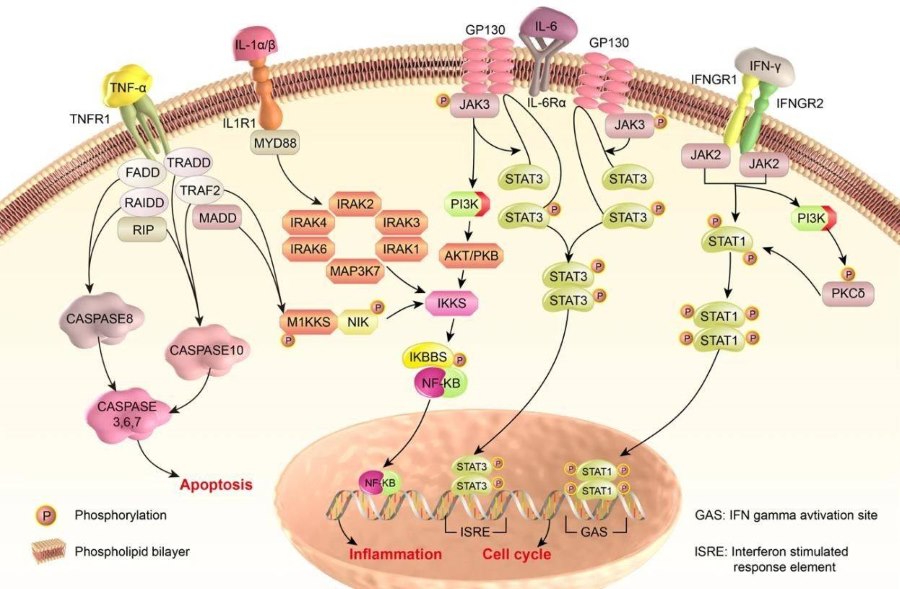As a leading CRO in the field of cancer immunotherapy, Creative Biolabs offers one-stop CAR-T therapy development services to our global clients using the world-renowned expertise in immuno-oncology and cancer therapy. CAR-T therapy has achieved significant clinical benefits to treat malignancies. However, excessive activation of engineered CAR-T cells may cause severe toxicities such as cytokine release syndrome (CRS). We offer small molecule drug discovery and development for CRS management to improve the safety of CAR-T cell therapy.
In modern therapeutics, CAR-T therapy exhibits promising anti-tumor activities for cancer treatment. While, CAR-T therapy does not exist alone as CAR-T cells can lead to excessive T cell expansion in vivo, which in turn can trigger the release of toxic levels of cytokines. It's also known as cytokine storm or cytokine release syndrome (CRS) ranging from mild swelling, nausea, and fever, to life-threatening multi-organ failure, even death. Hence, to prevent or limit the cytokine toxicities, CAR-T therapy must need to be combined with other approaches to balance the efficacy and toxicities of CAR-T cell therapy. One of the promising strategies is to utilize small inhibitory molecule drugs to suppress the cytokine release.
Even though corticosteroid has been widely applied in clinical trials with infusion of CAR-T cells to manage the CRS, it can induce the immunosuppressive effects which can impair the anti-tumor efficacy of T cell therapies. Hence, small molecule drugs are promising alternatives for CRS management. The abnormal intracellular signaling that contributes to CRS can be disrupted by small-molecule drugs. For example, Ruxolitinib (a small molecule inhibitor for JAK 1/2), Ibrutinib (a small molecule inhibitor for Bruton's tyrosine kinase (BTK)) have been demonstrated to inhibit the cytokine release at an early time point (see Fig.1).
Creative Biolabs now provides our clients with advanced high-throughput screening platforms to investigate the potential small molecule candidates with CRS management capacity. We can validate the efficiency of CRS management of the small molecule candidates provided by our clients, also we can use the libraries to screen the potential candidates targeting specific signaling pathways for our clients. Typical tested cytokines are IFN-γ, TNF-α, IL-1β, IL-2, IL-8, IL-10 and IL-12p70. Other cytokine markers can also be tested upon specific requirements of our clients. For cytokine release detection, multiplexed assays are available including enzyme-linked immuno-spot assay (ELISpot), intracellular cytokine staining assay (ICS), and flow cytometry. Our senior scientists will help provide the most suitable solutions for clients to develop small molecule candidates with great potential to manage the CRS levels.
 Fig.1 Molecular mechanisms of CRS.1
Fig.1 Molecular mechanisms of CRS.1
Creative Biolabs is dedicated to drug discovery and development services for our global clients. By outsourcing your programs to us, you can have valuable strategies and solutions to facilitate your small molecule drug development. With our experienced CAR-T therapy development services and other T cell engaging therapy development services, we are committed to offering the best small molecule drug discovery services to manage the CRS toxicities caused by T cell engaging therapies. Please contact us to learn more, and our scientists will get back to you as soon as we can.
Reference
For any technical issues or product/service related questions, please leave your information below. Our team will contact you soon.
All products and services are For Research Use Only and CANNOT be used in the treatment or diagnosis of disease.
 NEWSLETTER
NEWSLETTER
The latest newsletter to introduce the latest breaking information, our site updates, field and other scientific news, important events, and insights from industry leaders
LEARN MORE NEWSLETTER NEW SOLUTION
NEW SOLUTION
CellRapeutics™ In Vivo Cell Engineering: One-stop in vivo T/B/NK cell and macrophage engineering services covering vectors construction to function verification.
LEARN MORE SOLUTION NOVEL TECHNOLOGY
NOVEL TECHNOLOGY
Silence™ CAR-T Cell: A novel platform to enhance CAR-T cell immunotherapy by combining RNAi technology to suppress genes that may impede CAR functionality.
LEARN MORE NOVEL TECHNOLOGY NEW SOLUTION
NEW SOLUTION
Canine CAR-T Therapy Development: From early target discovery, CAR design and construction, cell culture, and transfection, to in vitro and in vivo function validation.
LEARN MORE SOLUTION